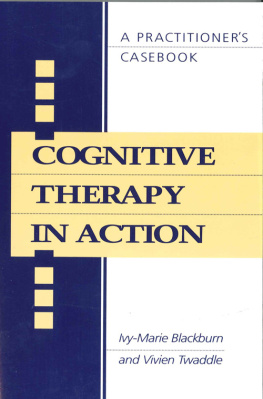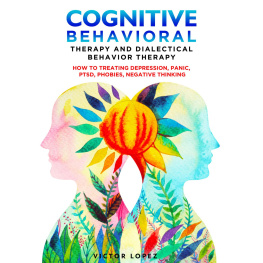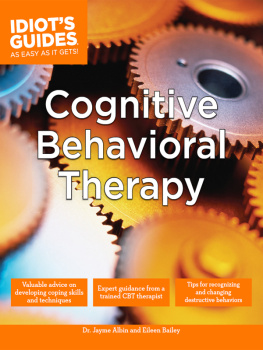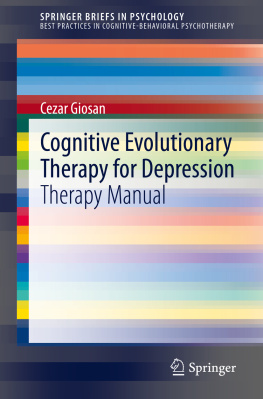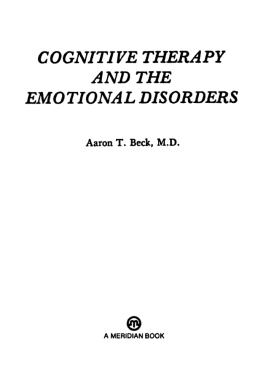

Contents
The referral
This book is for practitioners of cognitive therapy. It is about the therapeutic stories of six people referred to the Newcastle Cognitive Therapy Centre, each with a different emotional disorder. They represent the bread and butter clinical work of the Centre. For the purposes of confidentiality, details have been changed so as to camouflage the identity of the individuals. In writing the book, we have assumed a fair degree of theoretical knowledge and clinical experience in the reader, and so we have not gone into detail about basic concepts or strategies (see for an overview of our aims). Instead, space has been devoted to illustrating how to develop cognitive formulations, and make therapeutic decisions based on them. Because we are writing about real-life case studies, we have presented them warts and all and hope that our enjoyment of practising cognitive therapy has shone through.
The book begins with a chapter on the theoretical and ongoing evolution of cognitive therapy. It reasserts the guiding principles of the approach, and pays particular attention to the emerging themes that are of central importance to the clinical practitioner: for example, the integration of cognitive therapy with other theoretical traditions, the developing emphasis on the therapeutic relationship, the role of unconscious processes, constructivist models and the expansion of therapeutic strategies.
In Chapter 2 we present the empirical basis of cognitive therapy across all the emotional disorders described here. Interested readers are referred to the expansive bibliography . A selection of experimental studies aims to give a flavour of basic research methodology, and outcome research is extensively examined.
Chapters 38 are the clinical case studies. Each covers the same format: an outline of the disorder is followed by an explication of the specific cognitive model, details of the referral, and a section on assessment which includes symptomatology, history and presentation; the question of suitability for cognitive therapy is accorded a section of its own. Next, an outline formulation leads on to the plan of treatment and a description of the progress of therapy; then, the final formulation is proposed, which leads to a discussion of outcome, post-intervention prognosis and other pertinent issues. The case of depression is described by Ivy Blackburn, and that of obsessivecompulsive disorder by Vivien Twaddle. Ian James, clinical psychologist, has written the chapter on panic disorder, and collaborated with Ivy Blackburn on the chapter on personality disorder. Anne Garland, clinical nurse specialist in cognitive therapy, has contributed the chapters on bulimia nervosa and general anxiety disorder.
The final chapter covers topics that are, strictly speaking, outside the scope of this book, but which are relevant to the ongoing development of cognitive therapy: that is, therapist training, some uncharted theoretical territory, the need for empirical validation of recent theoretical concepts, schematic measurement, and the mechanism of change.
Cognitive therapy continues to be an exciting and rapidly developing area within psychotherapy. We hope that our enthusiasm for the approach comes across to you.
The Newcastle Cognitive Therapy Centre, which came into existence in 1988, was one of the first centres of clinical excellence for cognitive therapy in the United Kingdom. Its remit is threefold: to carry out research which is at the forefront of the field, to train clinicians in cognitive therapy, and to provide a specialist cognitive therapy service to patients in Newcastle-upon-Tyne and Northern England. Vivien Twaddle, consultant clinical psychologist, is the Head of Clinical Service for the Centre and, along with Steve Galvin and Jan Scott, was responsible for setting up the Newcastle post-qualification course to our knowledge, the first in the United Kingdom. She remains responsible for the clinical aspects of the Centre and its strategic direction within Newcastle City Health NHS Trust.
Ivy Blackburn, consultant clinical psychologist and visiting Professor of Clinical Psychology at the University of Durham, came to the centre from Edinburgh at the beginning of 1993 as Head of Training and Research. She has been the course director since the second year of the post-qualification course and has initiated and fostered research at the Centre. Two main areas of interest are outcome research and the investigation of methods of evaluating therapist competencies, with implications for training. In 1995 the post-qualification course received accreditation from Durham University in acknowledgement of its academic and clinical calibre. In 1994 the centre received its most important accolade when Professor A. T. Beck became its Honorary President.
In addition to Anne Garland for the chapters on bulimia nervosa and general anxiety disorders, and Ian James for the chapter on panic disorder and his contributions to the chapter on personality disorders, we wish to thank a number of others for making this book possible: Katharina Reichelt and Eileen Wardle for their invaluable secretarial assistance and patient determination; Lionel Joyce, Chief Executive of Newcastle City Health, for his continued moral and financial support and the brave risk he took in backing the Centres inception in 1988; Tim Beck, whose inspiration the book was in the first place; and last, but certainly not least, the patients.
I.-M. Blackburn
V. Twaddle
1
Cognitive therapy is the field of applied psychology that is unified by a belief in the central role played by mediating knowledge structures or thinking processes in explaining and changing human behaviour. While acknowledging a reciprocal interaction between cognition and emotion, the many diverse orientations within cognitive therapy tend towards viewing cognition from the point of view of its contributory role in influencing emotion, although a few have begun to explore emotion as a primary source of information and meaning in its own right. All orientations draw heavily on a broad repertoire of cognitive and behavioural techniques, and some are expanding into experiential methods.
This chapter attempts to explore some of the historical roots of this evolving field of psychotherapy. It splits the discussion into two main sections, which broadly represent the first and second twenty years of the lifespan of cognitive therapy to date. It attempts to illustrate the intrinsic and ongoing dialectical growth process that continues to enhance cognitive therapys utility and range of application. And while considering what is quite unique about this type of psychotherapy, we address emergent integrating issues.
The theoretical (and practical) underpinnings of cognitive therapy were shaped by a variety of sources both within the general field of psychology and within applied clinical observation and practice. From the general field, three major strands of thinking stand out: the phenomenological approach and its contention that the view of ones self and of the world is central to the determination of behaviour (Adler, 1936; Horney, 1950); structural theory, which expounds the concept of hierarchical structuring of knowledge to include primary-and secondary-process thinking (Piaget, 1972); and the academic field of cognitive psychology which, while integrating both assumptions, stresses the importance of cognition in information-processing and behavioural change (Williams
Next page
